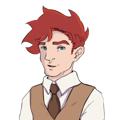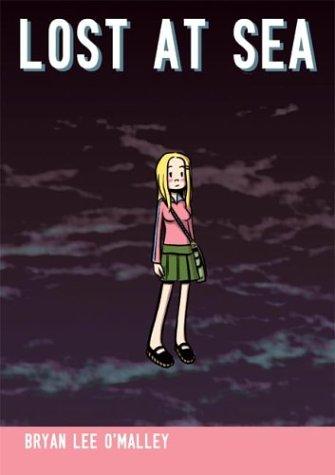Literally Graphic reviewed Lost at Sea by Bryan Lee O'Malley
2024 Review
3 stars
And today's pick is Lost at Sea by Bryan Lee O'Malley. This stand alone title was published by Oni Press in 2003.
I picked up this title because when the Scott Pilgrim cartoon on Netflix was coming out my interests were more piqued then they had been previously by the discourse. But I was feeling lazy, so I figured I would start with O'Malley's stand alone title.
This graphic novel is labeled for readers 13+, with content notes for f bombs, smoking, HP reference, dissociation, age gap relationship in high school and r word.
Keywords that came to mind: Cats, depression, divorce, California, British Columbia, and teenagers.
The summary is "Raleigh doesn't have a soul. A cat stole it – at least that's what she tells people – at least that's what she would tell people if she told people anything. But that would mean talking to people, and the mere thought of social interaction is terrifying. How did such a shy teenage girl end up in a car with three of her hooligan classmates on a cross-country road trip? Being forced to interact with kids her own age is a new and alarming proposition for Raleigh, but maybe it's just what she needs – or maybe it can help her find what she needs – or maybe it can help her to realize that what she needs has been with her all along."
Browsing O'Malley's Wikipedia page... Married to fellow cartoonist Hope Larson from 2004-2014 O'Malley is from London, Ontario (although he's lived in many cities across so called north america) he is of Korean, Irish and French-Canadian decent. Recipient of many awards. They have one other stand alone anthology with other people entitled Seconds and are currently working on the intriguingly named Snotgirl.
Flipping through Lost at Sea the art is pretty simple, minimalistic and anime inspired. Perhaps unsurprisingly, I really enjoyed it.
Writing wise... It really gave me top notch depressed teenager vibes. Like it literally felt like I was stepping back in time. Of course, being kind of scared of teenagers now, I'm not sure if teenagers are the same these days. Probably not, but let me know if you have a more informed perspective.
Similar to some other stories that mix magic and mental health, I'm not sure if I can objectively say this is not a great idea. But I can say, I have mixed sort of negative feelings about it. But I might still just be stuck in a personal preference for more specific language myself. Although I guess in this case it would be an improvement for someone to realize they are depressed, seem to be disassociating, and are probably neurodivergent rather then think they have no soul. But what is fiction for?
The one part that I really hope we've completely left in the past is Stephanie being a 1000% not like other girls. Even mentioning to Raliegh early on that she's not friends with girls.
Otherwise when it comes to gender it felt like something trans was going to happen at any moment honestly. Some of the discussion seemed to hint about people changing pronouns and some of what Raleigh was feeling kind of gave dysphoria vibes to me. But looking around, there doesn't seem to be anyone else talking about it so I guess perhaps I misinterpreted the dialog. Obviously I'm allowed to interpret the vibes as I think makes sense.
Also meat eating seems to be part of the social construct called the gender binary in this case. As both females are vegetarian and the dudes are not.
Sexuality was largely off screen. Raliegh's journey starts out as chasing after an older guy who made her feel normal. Another part you hope has become a bit more dated in recent times. This is balanced out (for me at least) fairly nicely in the moment by having all the on screen relationships be platonic. No queer stuff though. Which honestly also feels very dated lol. I'm pretty sure a high percentage of these characters come out in some way or another as they grow up.
Class does come up in some novel ways. Specifically Raliegh thinks her mother sold her daughter's soul - after the divorce - in exchange for money and career success. Which is certainly one explination.
And however you want to label Raliegh, she is definitely a bit disabled by her current mental state. Although in this case, things are at least improving by the end of the story. Although I promise you, she is going to struggle with this for a long time. One aspect that I found really interesting is how Raliegh very clearly thinks very negative things about herself, but whenever anyone else finally gets the chance to voice their thoughts about her they are all pretty positive. While not always true, I always appreciate the suggestion that those of us who struggle like this are often harder on ourselves then is honest.
For all that the roundtrip overall felt like it kind of floated through a nothingness labeled california, place plays a pretty key roll at the climax of the story. Which is always nice.
Race was completely unexplored.
Wrapping this more personal usual review up, this book kind of felt like a Millennial Gen-X artifact. A solid three stars.

